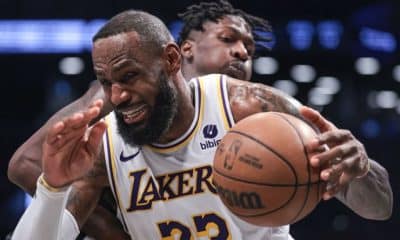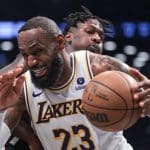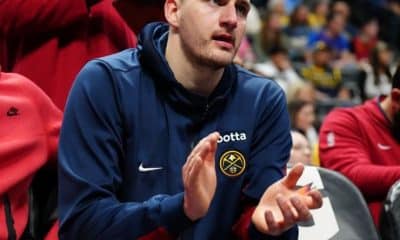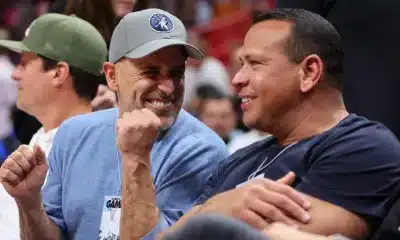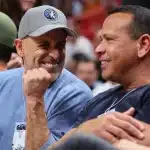NBA
A Warped Sports Fantasy Land
The actions of Texas Tech “super fan” Jeff Orr represent an alarming trend toward seeing collegiate and professional athletes as nothing more than pawns in a warped fantasy land.

As someone who works with 19-year-olds on a daily basis, I am persistently reminded how their brains are still developing. As a college professor it is a true privilege to watch young people grow and gain a more stable sense of self. Within that process though, there is much fragility.
Our society erroneously assumes that adolescents become adults the moment they turn 18. Neuroscience paints a different picture and reminds us that a brain is not fully mature until age 24 or 25. Perhaps that is what is so disturbing to me about what happened at Texas Tech last week.
What kind of warped fantasy land have we created where a 50-year-old adult can call a 19-year-old young man “a piece of crap” (or worse, according to some reports). Where else in society would people see this as just a part of the culture?
There is a part of me that is just fine with Smart pushing “super fan” Jeff Orr. Does anyone truly believe Orr would have behaved the same way had he met Smart on a street in Lubbock, Texas? It seems there is this sort of “fan courage” that spectators develop that gives them, in their mind, the right to say whatever they want to. It’s almost as if they are no longer taunting humans. Instead, the players become simply pawns in some sick fantasy. So yes, there is a part of me that says these fans deserve what is coming to them.
I am reminded of a night some years ago in Denver when Kenyon Martin, then a member of the Nuggets, walked up into the stands to confront a fan. It was actually kind of funny to see how quickly that fan went from “tough guy” fan to darned near ready to assume the fetal position. It demonstrated just how quickly the barrier between fantasy and reality could evaporate.
As a player, I was always taught to take the high road. This was usually fairly easy for me since I tend to have thick skin, but it was harder when I was younger. Young people are more likely to act impulsively, especially in emotionally charged situations. Such is life with a still developing prefrontal cortex. This can make taking the aforementioned high road substantially more difficult.
Within this debate, my better judgment eventually takes hold and nudges me toward the position of nothing good happens from a player making physical contact with a fan. However, it raises an interesting question: with whom do we place the majority of responsibility? My anecdotal observations have led me to the unsettling conclusion that the majority of folks have placed the responsibility on a 19-year-old kid. Where does the responsibility of fans begin?
Sport provides a wonderful escape for millions of people around the world. Escape can be healthy psychologically provided that it does not happen too frequently or become larger or more important then the person’s actual reality. With fans like Orr, it is certainly not out of bounds to question whether he has formed too much of his identity around a game played by young men who have not yet reached true adulthood.
It would be a mistake to presume that Orr is the only fan engaging in such behavior. It is likely that this happens in venues across the country every night. This is a systemic problem the won’t be resolved by having Orr stay away from Texas Tech basketball games for the remainder of the season as he has agreed to do. Truly tackling this problem will require reversing a mindset about sport that was set in motion at least two decades ago.
One could make the argument that it is different in professional sports, where athletes are paid millions of dollars. But how is it that fans have come to understand they can say or do whatever they want without repercussions? Shall there be no line drawn? I’m struggling hard to find another area of society (other than as an anonymous poster on the internet or social media) where one can do or say whatever one wants with absolutely no consequences. We have freedom of speech, yes, but that freedom comes with consequences and responsibility.
I have recently observed the reaction of Denver Broncos fans (of which I am one) in my home city of Denver over the last couple of weeks. Most seem to have handled the Super Bowl debacle in a healthy way. However, there are some who have had held on to it a bit too tightly.
If the result of a sporting event is causing turmoil between you and your significant other, keeping you from performing at work, or leading to a depressed state for more than a short period of time, it’s probably time for you to reevaluate your priorities. If you are an adult male who during the course of a sporting event refers to a 19-year-old kid as a piece of crap, it’s time for you to look in the mirror and perhaps consider seeking professional help. The fact some (many?) people in the culture give Orr a pass by chalking this up to just being a fan speaks to the sickness of our society.
Orr is just another sorry example of how sport, and those who follow it, have spiraled completely out of control. If you are not outraged by his behavior than I dare say you might be lacking a pulse and are a major part of the problem.
There are thousands of other Jeff Orrs attending sporting events regularly whose despicable behavior is not publicized. Unfortunately, many of these folks will not have the self-awareness necessary to see the behavior they engage is equally as putrid as Orr’s. Hopefully the broader culture of sport can continue to call out such behavior in an effort to demonstrate that it will not be tolerated.
Dr. Travis Heath is a psychologist in private practice, assistant professor of psychology at MSU Denver and former team consultant in the NBA. He also co-hosts a show on Mile High Sports Radio on Tuesday nights at 6 p.m. You can follow him on Twitter @DrTravisHeath.
Add Basketball Insiders to your Google News Feed!
-
Main Page 1 week ago
LeBron James joins Michael Jordan as only NBA players with multiple 40-point games after turning 39
-
Main Page 1 week ago
Nikola Jokic 1st NBA player since Oscar Robertson with 26+ points, 18+ rebounds, & 16+ assists in a game
-
NBA 1 week ago
Ex-MLB star Alex Rodriguez vows to keep trying to buy Timberwolves franchise despite rejection
-
Main Page 1 week ago
Kings are 14-5 this season when Keegan Murray scores 19+ points
